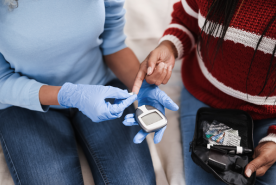At least 10 million Americans suffer from incontinence, which means that they are not able to control the times when they urinate. In some cases, the loss of urine is so small that people are hardly aware of it. In other cases, the amount of leakage is quite large. Only about 10 percent of people who suffer from incontinence seek treatment. Without treatment, many of these people stay at home and withdraw from life unnecessarily. Incontinence is not a disease, but it can be a symptom of disease.
Does pregnancy cause urinary incontinence?
Pregnant women may have a small amount of urine leakage due to the pressure of the baby against the bladder and the muscles that support it. Usually, this leakage occurs when the woman coughs or sneezes. The problem generally goes away within three or four months after the baby is born. It is helpful if the woman does exercises, called Kegel exercises, to strengthen the muscles. Sometimes, women who have had children are more likely to develop incontinence when they get older due to weakening of the muscles that support the bladder. This is sometimes treated by medications, but surgery may be needed in some cases.
Which diseases can cause incontinence?
Diabetes, strokes and nerve diseases, such as multiple sclerosis. These diseases can damage the nerves that control the bladder which is where urine is stored before it leaves the body. These diseases can also weaken the "sphincter," a ring of muscle around the opening of the bladder. This ring usually keeps urine from leaking out. Men can have incontinence from problems such as overgrowth of the prostate gland or cancer of the prostate gland, both of which can block the flow of urine. In these cases, urine leaks out when the bladder becomes too full.
How can I tell if I have urinary incontinence?
If you are having urine leakage, you should seek medical care to find out the cause. The doctor will ask you about your medical history and order laboratory tests. The doctor will also examine you. Sometimes, special tests may be done. In one of these, the bladder is filled with fluid. You will then be asked to repeat the action that usually causes you to have urine leakage, such as coughing or straining. X-rays and other measurements are then done to help the doctor find out why you are having the urine leakage.
Are there any treatments?
Yes. Urine leakage can often be stopped or lessened after the doctor finds the cause. Some treatments that have helped other people include drugs, behavioral therapy, special exercises, biofeedback, electrical stimulation and surgery.
DRUGS: Several drugs are available for treating incontinence, depending on what is causing your problem. Some of these drugs, called "bladder relaxants," prevent urine leakage by decreasing bladder contractions. Another type of drug helps some kinds of incontinence by strengthening muscle contractions at the outlet of the bladder. Estrogens also have been helpful for some women after menopause. A nasal spray that causes you to make less urine is also used for day and nighttime urine leakage (bed-wetting).
BEHAVIORAL THERAPY: You can work with a specially trained therapist who will help you to control your urine leakage.
EXERCISE: You can learn to do special exercises to strengthen the muscles that prevent leakage of urine from the bladder.
BIOFEEDBACK: These techniques also help you to gain control over your bladder and to strengthen the sphincter muscle.
ELECTRICAL STIMULATION: This method can help you to strengthen your sphincter muscle and keep your bladder from contracting when you do not want this to happen.
SURGERY: Usually, your doctor will first try medical treatments such as drugs, biofeedback, etc. If these do not work, surgery may be planned. Some types of urinary incontinence due to weakness of the sphincter can be corrected by strengthening the muscle with surgery. A newer technique involves injecting collagen (a protein material) around the urethra to support and compress the sphincter muscle.
What if these treatments do not work?
These treatments should bring relief to most people who have urinary incontinence. However, if the treatments do not work for you, many absorbent protective pads are available to use. In men, a special sheath, known as a condom catheter, may be worn around the penis to drain the urine into a bag.
Sometimes, a tube called an in-dwelling catheter may be placed into the bladder to drain urine continuously. This method can cause problems, such as infections, and should be used only in special cases as a permanent form of treatment. Another approach is to use a catheter several times a day to drain the bladder.
Will incontinence prevent me from being active sexually?
Not necessarily. Often, there is no physical reason why a person with incontinence cannot be sexually active. However, some of the diseases that cause incontinence, such as multiple sclerosis and diabetes, also may decrease the ability to perform sexually.

















